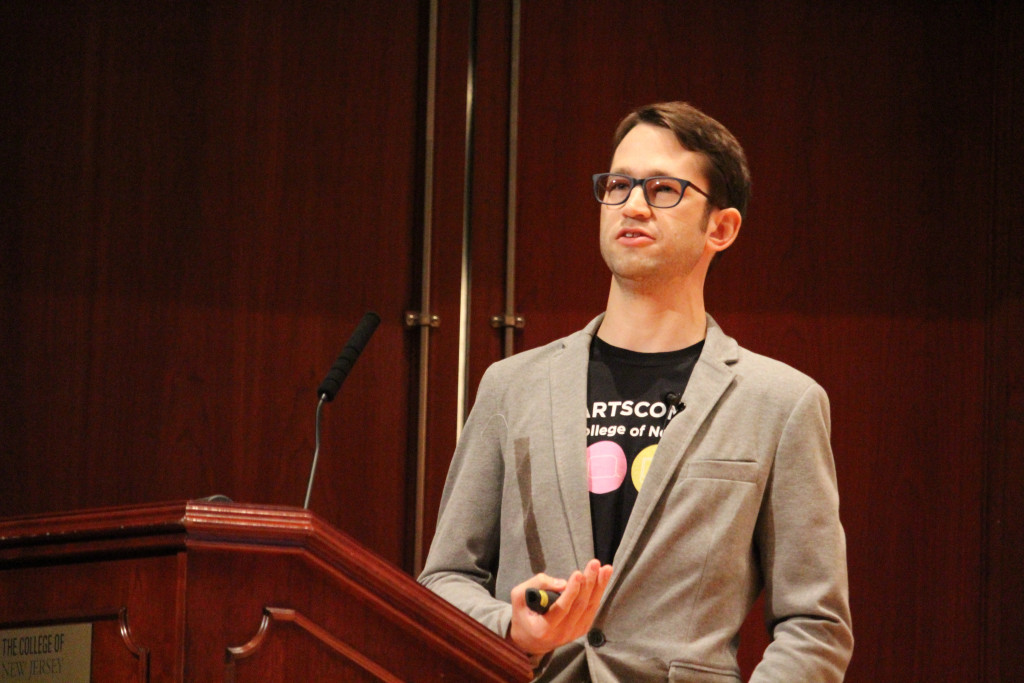By Alyssa Gautieri
Staff Writer
Studies have shown that video games utilize different parts of the brain, according to game designer Josh Fishburn, who is an interactive multimedia associate professor at the College.
“This is what I would tell parents — that every game is an educational game, in a sense,” he said
During his Brown Bag presentation on Friday, Nov. 20, in Mayo Concert Hall, Fishburn discussed the challenges he has experienced when designing games.

Fishburn said he does not believe that violence in video games has drastically negative effects on children.
“I think it becomes a problem when that is the only type of game available and played,” he said.
Fishburn said the key to a healthy user experience is diversity. When both designing and playing games, he values variety.
“Designers of video games have something in common that originators in other art forms do not,” Fishburn said. “That is, that they are not dead yet!”
His presentation, entitled “Who Makes Games?,” showcased various artists’ opinions on the matter.
Fishburn’s graphic design friend, Rick Griffith, told him, “We don’t ‘make’ games. We ‘design’ games, and it is in the act of designing interaction, opportunity, conflict, competitive frames, stories and use of time for people that games are made.”
Another of Fishburn’s colleagues said that anyone can make games: It is as simple as deciding to shoot baskets with a crumbled up piece of paper into a trashcan at work.
These responses helped Fishburn to think of all of the challenges making or designing games posed for the ambitious group of game designers.
Fishburn gave several examples of challenges that can be presented to the game designers, including developing a personalized platformer (a platform game in which users guide an avatar to jump between suspended platforms), making a game with one button, simulating an entire universe, incorporating realism, making the fourth dimension known, showing what depression is like to those who have never experienced it or telling a story of gender reassignment.
According to Fishburn, new media is not replacing other forms of media, but it is changing the way media is consumed.
“It is new in some sense, but for a lot of games, (it is) an extension of storytelling,” he said.
Fishburn showed the audience an example of storytelling through video games. When tackling the challenge of “how to tell a story of gender reassignment and hormone therapy.” Fishburn showed a game that took a very serious subject and turned it into a game anyone can play.
“The game really beautifully tells this personal story,” Fishburn said as he recalled the individual who inspired the game.
When designing a platform game to be original, there can be challenges. According to Fishburn, a game called “Mushroom 11” has been in the works for over four years. The game creators have been polishing and altering the game ever since the original prototype was created in 2011.
The prototype for “Mushroom 11” tried to use realistic physics to create a new experience, Fishburn said. However, when he played the prototype on the large screen for the audience, his character died almost immediately. Four years later, after the game had experienced massive changes, the platform moves quicker and smoother, and Fishburn is able to play more easily. The designers have also added colors, music, options, levels and new updated features. However, the overall idea of “Mushroom 11” has remained the same. Through the demonstration, Fishburn illustrated the strenuous amount of time and effort that is spent in developing an original game.
Fishburn also discussed how to show what depression is like in a game for people who haven’t experienced it.
“Most games want you to feel like you can do anything and make you feel like you’re powerful,” Fishburn said.
However, in the game “Depression Quest,” the game presents the player with a number of options, but limits which options they are able to choose. The game strips the player of power and gives them a sense of what depression can be like for those who struggle with it.
Fishburn said game designers bring whatever personal stories and individual skills they have to the table and their goal is to create original and entertaining games that tell a story.







